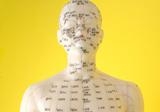Acupuncture for depression
Laser acupuncture is a plausible treatment for depression and other mental disorders, UNSW researchers have shown for the first time.
Laser acupuncture is a plausible treatment for depression and other mental disorders, UNSW researchers have shown for the first time.

Acupuncture produces significant changes in parts of the brain that regulate emotional states and is a biologically plausible treatment for depression and other neuropsychiatric disorders, UNSW researchers have shown for the first time.
The scientists, from UNSW's School of Psychiatry, used functional magnetic resonance imaging (fMRI) to map the changes in the prefrontal cortex and subcortical nuclei brought about through the stimulation of the body's acupoints by laser acupuncture.
"This is the first MRI study to find that laser stimulation of a suite of acupoints on the body in healthy individuals produces changes in brain regions that may be relevant to treating conditions such as depression," said study chief, Scientia Professor Perminder Sachdev, from UNSW's School of Psychiatry.
"It's a scientifically rigorous study in a controversial area. It is being followed up with a similar study in depressed individuals, and a clinical trial of laser acupuncture in depression."
A paper outlining the findings appears this week in the journal PLoS Online.
In the study, 10 healthy subjects were stimulated with a fibreoptic infrared laser on four acupoints (LR14, CV14, LR8 and HT7) used for depression following the principles of Traditional Chinese Medicine. A control non-acupoint (sham point) was also stimulated in a random design.
The subjects were unaware of the relative significance of different acupoints. The use of low-level laser acupuncture, which does not produce a skin sensation, permitted the blinding of subjects to placebo stimulation, something difficult to achieve with needle acupuncture.
"The most consistently reported finding in antidepressant treatments is that they lead to a normalisation of activity in the prefrontal cortex, with additional changes in the limbic cortex and the frontal lobe," said lead author and PhD candidate Dr Im Quah-Smith.
However, while the MRI clearly demonstrated the effects of acupuncture in the brains of healthy people, it remained to be seen whether the results would be different in a sample of clinically depressed subjects, Dr Quah-Smith said.
"We also cannot predict from these results whether any acupoint should be preferred over others for clinical use. Both these questions warrant further investigation," she said.
Contact: Dr Im Quah-Smith | 0419 694 505
UNSW Media contact: Steve Offner | 02 9385 8107 | s.offner@unsw.edu.au